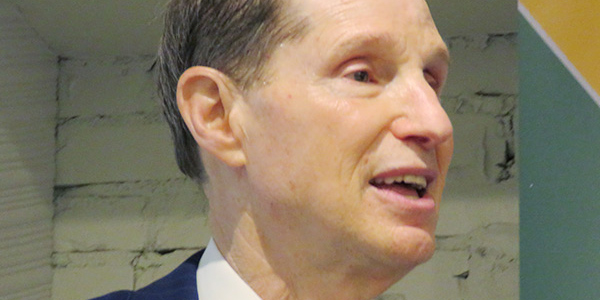Last year, Sen. Ron Wyden (D-Ore.) kicked off the American Council on Renewable Energy Policy Forum hoping to inspire bipartisan collaboration on clean energy initiatives. (See ACORE Forum Discusses Coalition Building, Winning GOP Support.)
This year, with new leadership in D.C., he looks forward to taking actionable steps toward U.S. emissions reduction goals.
“One of the issues that looks totally different today than a year ago is the prospect of passing bold clean energy legislation that finally addresses what we know to be the existential threat of climate change,” he said during his keynote remarks at this year’s forum on Wednesday.
Wyden is hopeful that there are bipartisan solutions to address the climate crisis, and he plans this spring to reintroduce his Clean Energy for America Act, a bill that died in the last legislative session. The bill addresses what Wyden referred to as “our country’s broken energy tax code.” The current code includes 44 tax breaks and “too many” subsidies for oil and gas producers, he said. Wyden’s proposal would replace them entirely with three new “tech-neutral provisions” for clean energy, clean transportation and energy efficiency.
“My proposal, which puts all zero-emission technologies on a level playing field and then lets the free market go to work, also does the best job of achieving the present goal of a zero-emission power sector by 2035,” Wyden said.
He criticized the current tax code, saying it’s “rigged to cut big, automatic checks to fossil fuel companies.” He called these the policies of “yesteryear” and said his proposal was created to give equal opportunity to all zero-emission technologies to promote adoption.
“The opportunities like the ones we have in this Congress don’t come along very often,” he said. “And my view is that lawmakers have the chance to reset our energy tax system in a way that firmly focuses on the key goal: reducing and eventually eliminating carbon emissions.”
Wyden is optimistic that his bill will draw bipartisan support and described it as a “win all around.”
Senate “members know that clean energy, clean transportation and energy efficiency are big magnets for good-paying jobs. And it would be self-sabotage for the United States to forgo [the] opportunity to create red-white-and-blue jobs and continue propping up dirty policies and dirty industries from the last century.”




